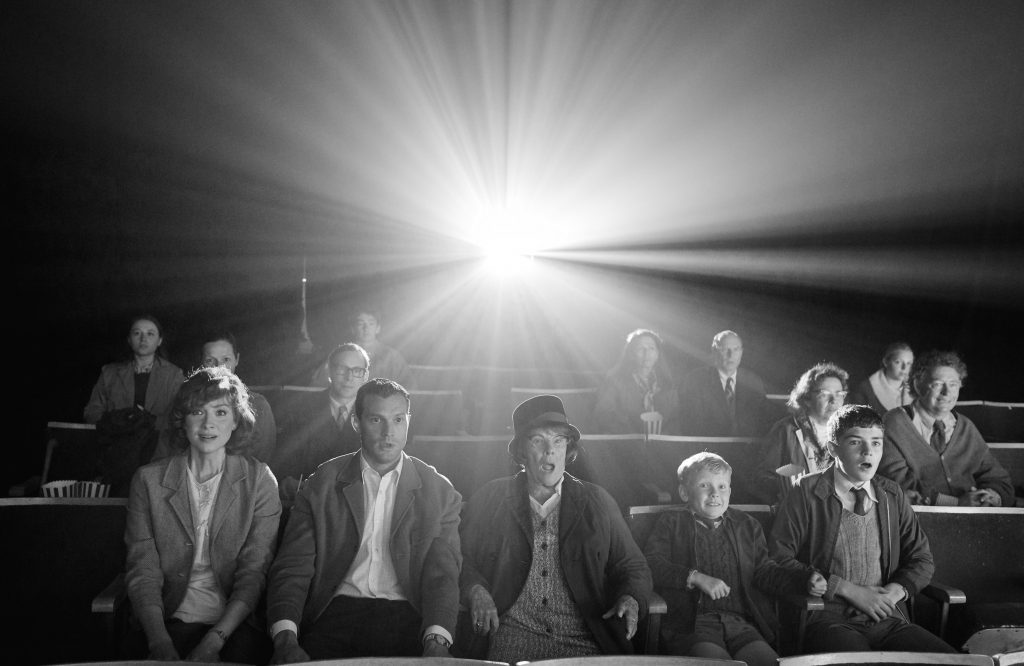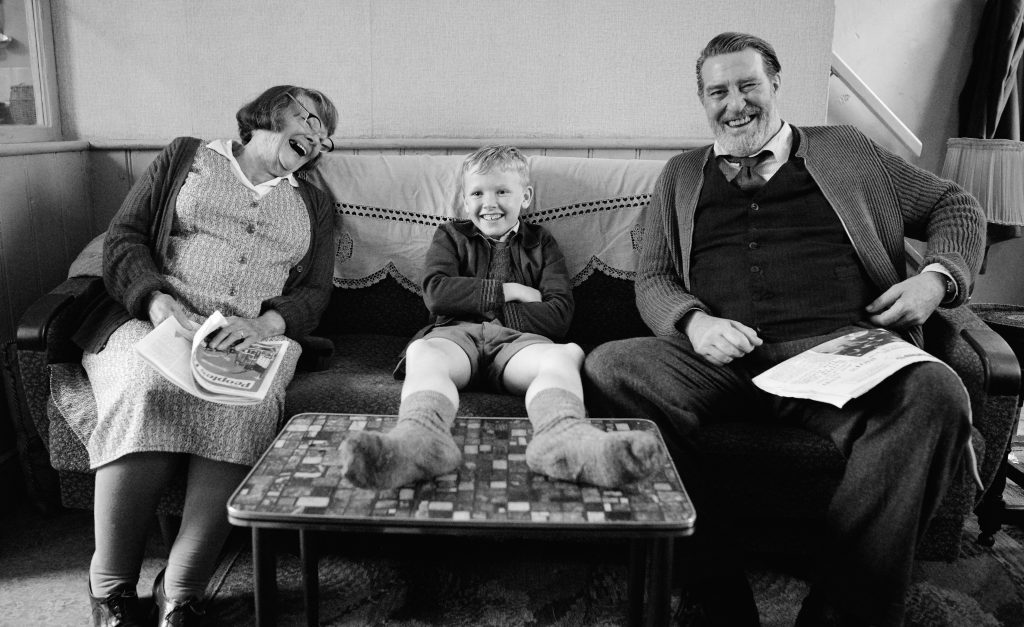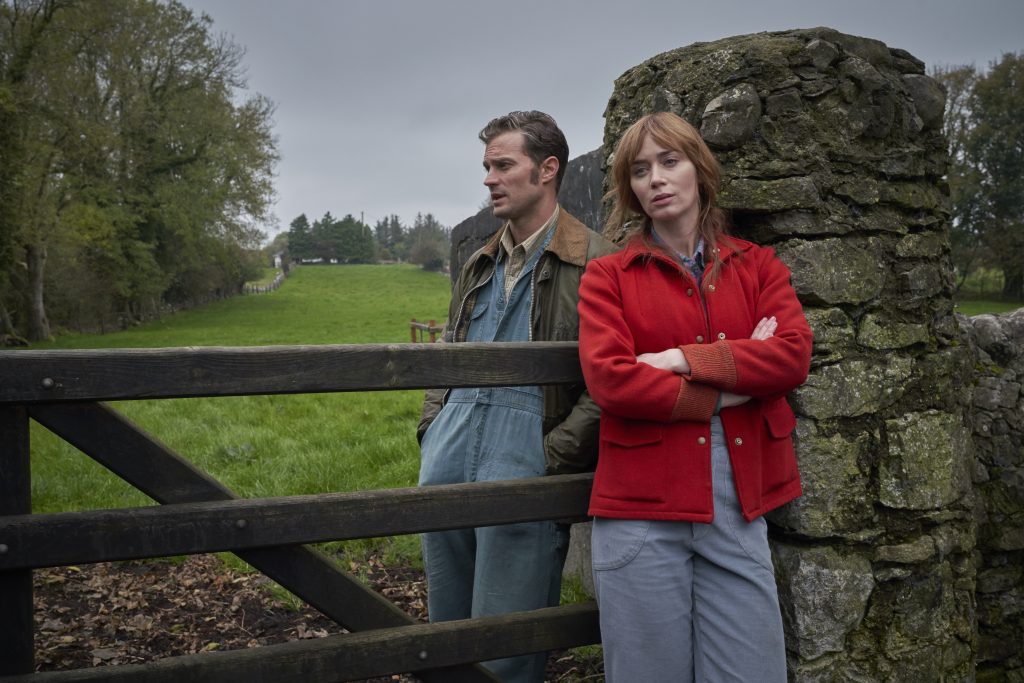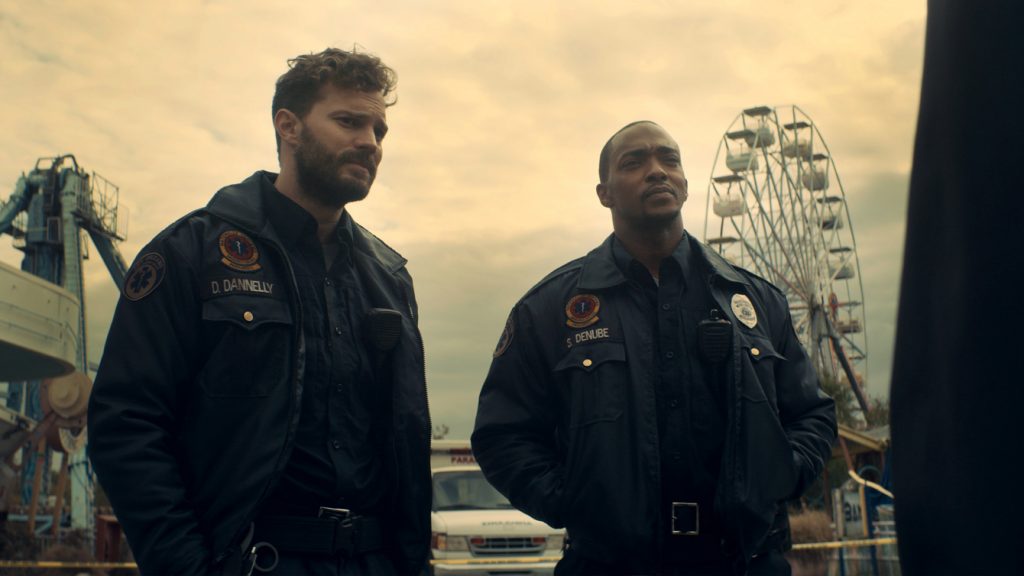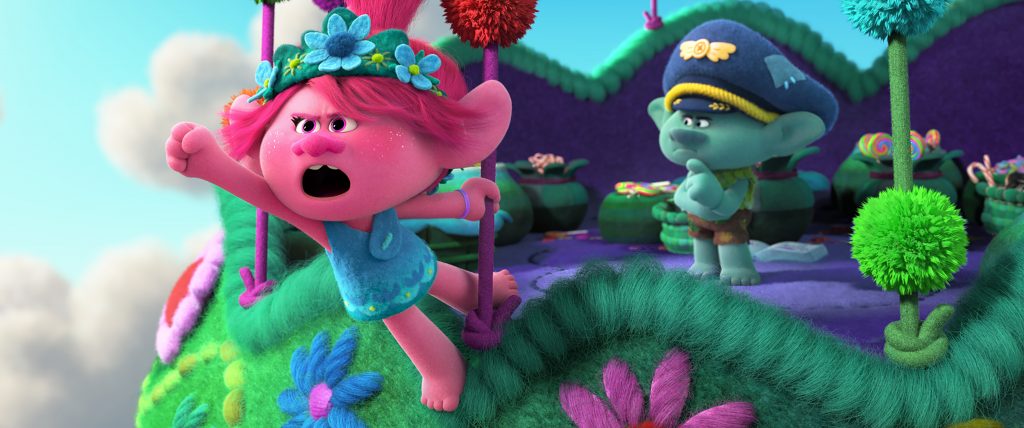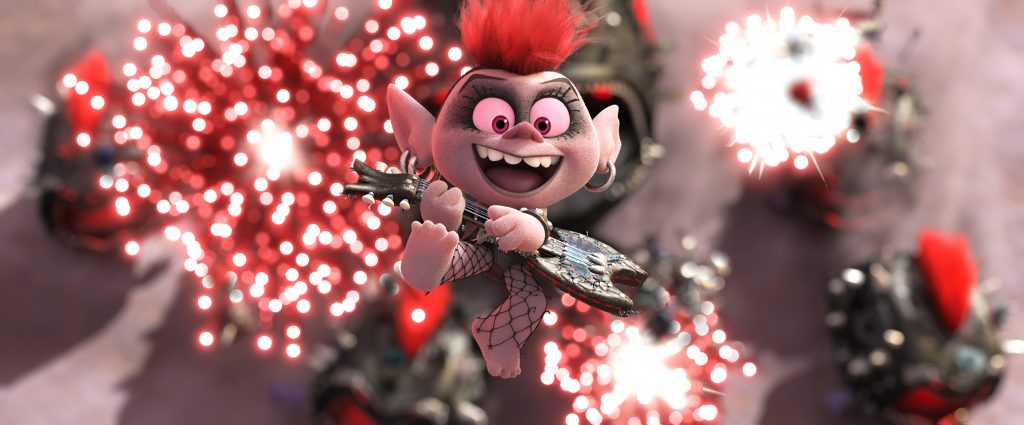September 9, 2023
by Carla Hay
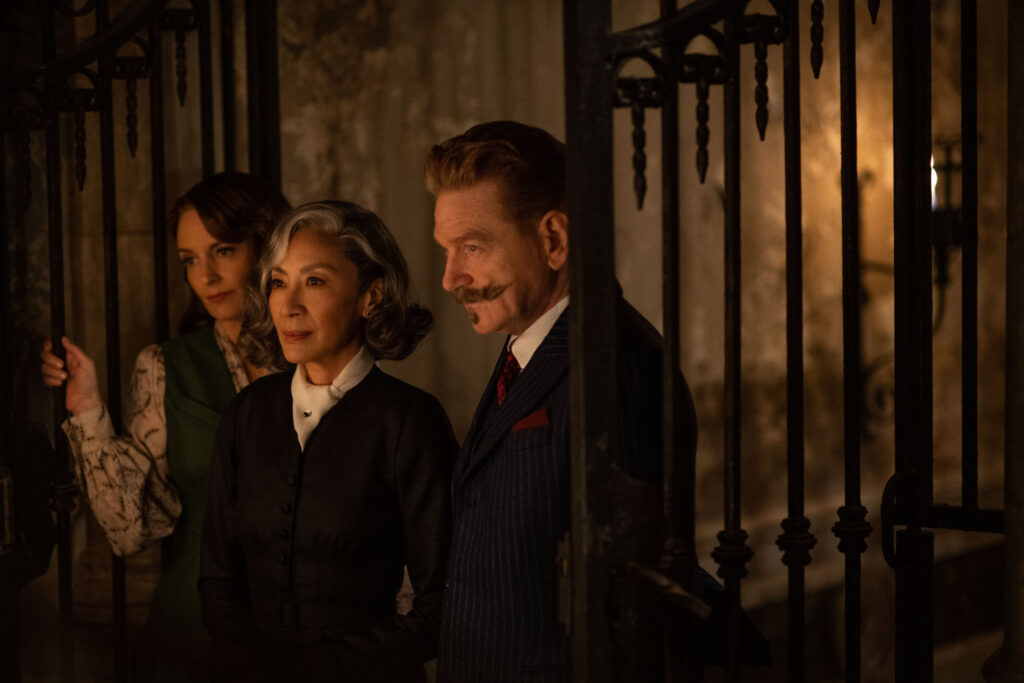
Directed by Kenneth Branagh
Some language in Italian and Latin with subtitles
Culture Representation: Taking place in 1947, in Venice, Italy, the horror film “A Haunting in Venice” (based on Agatha Christie’s novel “Hallowe’en Party”) features a nearly all-white cast of characters (with one Asian) representing the working-class, middle-class and wealthy.
Culture Clash: Famous and super-intelligent Belgian detective Hercule Poirot comes out of retirement to solve the murder of someone who died a gruesome death during a Halloween party séance.
Culture Audience: “A Haunting in Venice” will appeal primarily to people who are fans of Agatha Christie novels, the movie’s headliners, and competently told murder mysteries with supernatural elements.
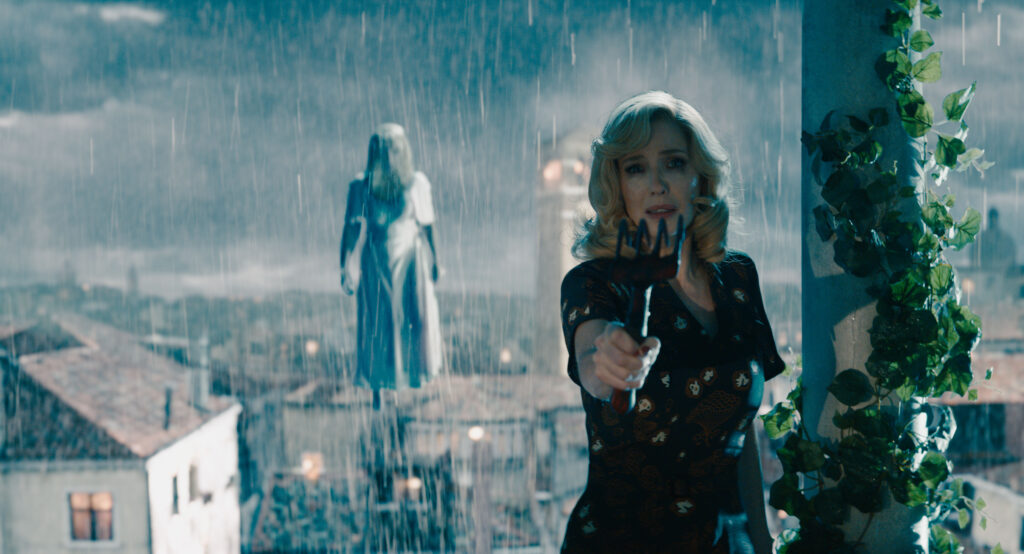
“A Haunting in Venice” is another efficient but not exceptional offering in director/star Kenneth Branagh’s star-studded series of murder mystery films based on Agatha Christie novels. This horror movie delivers enough intrigue to outweigh some motonony. The other Branagh-directed movies adapted from Christie novels were dramas with no supernatural elements to the stories. “A Haunting in Venice” is a ghost story that makes famed Belgian detective Hercule Poirot (played by Branagh) question his belief that ghosts don’t exist.
As the third film in a series of Hercule Poirot movies directed by Branagh, “A Haunting in Venice” is the one that is literally the darkest, not just in terms of the cinematography but also in its emotional tone. The previous two Branagh-directed Hercule Poirot movies—2017’s “Murder on the Orient Express” and 2022’s “Death on the Nile”—contrasted their glamorous locations with the ugly realities of murder among rich and beautiful people. In “A Haunting in Venice,” Detective Poirot and his group of potential suspects not only have to deal with the murder investigation but also the possibility that a ghost might be in their midst, in a gloomy palazzo that has lost a lot of its former attractiveness.
Michael Green adapted the screenplay for “A Haunting in Venice” from Christie’s 1969 novel “Hallowe’en Party.” The movie (which takes place in 1947 and was filmed on location in Venice, Italy) has some touches of comedic riffs between a few of the characters. But for the most part, it’s a pure horror story, with multiple scenes of possible spirits possessing and terrifying living human beings. The ever-logical and fact-finding Hercule remains deeply skeptical about the existence of ghosts, until he starts to wonder if he might be wrong.
In the beginning of “Haunting in Venice,” Hercule is enjoying his retirement asa resident of Venice, a city surrounded by water and where boats, not trains or buses, are the main form of group transportation. Hercule meets up with his sarcastic American friend Ariadne Oliver (played by Tina Fey), an author of mystery novels whose career has been fading because of her most recent books have flopped. It’s established early on that Ariadne is desperate for a comeback, even though she doesn’t really want to admit it to everyone.
The friendship between Ariadne and Hercule goes back to the 1930s. And it hasn’t been an entirely smooth relationship. Ariadne became a popular author because she based her main detective character on Hercule, without asking his permission. It’s caused some tension between Ariadne and Hercule.
Ariadne has a plan to make a comeback by writing a book with a new angle: Ariadne wants the main plot of her next book to be based on a real-life person who can leave Hercule confounded during a murder investigation. She has already decided that the person who can outwit Hercule is someone who has been making a living as a renowned psychic: Joyce Reynolds (played by Michelle Yeoh), who claims to have the ability to speak to the spirits of dead people.
Ariadne tells Hercule about a lavish nighttime Halloween party that retired British opera singer Rowena Drake (played by Kelly Reilly) is hosting for local orphaned children at Rowena’s palazzo, which used to be an orphanage where children were mistreated. The palazzo isn’t entirely run-down, but it’s not exactly in the best of shape. In fact, it has a reputation for possibly being haunted by children who died at this location.
Ariadne has been invited to this party and wants to bring Hercule as her guest. Ariadne is up front with Hercule in saying that she’s not going to the party because of the orphans. Ariadne wants to go to the party because Rowena will be having a séance where single mother Rowena hopes to contact the spirit of her young adult daughter Alicia Drake (played by Rowan Robinson, shown in flashbacks), who died one year ago, after falling from a balcony at the palazzo. The fall is widely believed to have been a suicide, since Alicia had been depressed and dealing with other mental health issues after a breakup from her fiancé.
Joyce has been hired to be the psychic who will lead the séance. Ariadne wants to use what happens at the séance as the basis for Ariadne’s next book. Hercule doesn’t believe in the afterlife. He thinks it’s utter nonsense to believe that ghosts exist. Ariadne is very superstitious and thinks ghosts can exist. Part of Ariadne’s agenda is to get Hercule to change his mind.
Needless to say, someone ends up being murdered at the party, and Hercule ends his retirement to investigate the murder. The death happens when this murder victim is thrown from a stairwell onto a statue that impales the person. As shown in the trailer for “A Haunting in Venice,” Hercule almost gets murdered himself, when someone tries to drown him by forcing his head underwater in a bucket meant for bobbing for apples. And viewers will not be surprised if more than one person ends up dead by the end of “A Haunting in Venice.”
Some viewers might ask themselves while watching the movie: “What kind of person throws a séance during a party for children?” It’s explained that Rowena has been distraught with grief, ever since the death of her only child, Alicia. Rowena’s relationship with Alicia is described as more like sisters rather than mother/daughter. She was also very protective of Alicia.
The children are in another part of the palazzo during the séance, but things start to get dangerous when a huge chandelier falls down in the middle of a room where some of the children are. Luckily, no one is hurt. The party for the orphans essentially ends, but the séance continues, with one child in attendance who is not an orphan: Leopold Ferrier (played by Jude Hill) is the precocious 10-year-old son of widower Dr. Leslie Ferrier (played by Jamie Dornan), who is the Drake family’s personal physician. (Dornan and Hill also played a father and a son in director Branagh’s autobiographical Oscar-winning 2021 film “Belfast.”)
Dr. Ferrier is also a World War II veteran who has post-traumatic stress disorder, which has damaged his career and negatively affected his relationship with his son. Leopold and his father are both British. Multiple times in the movie, it’s mentioned that Dr. Ferrier was very fond of Alicia. The implication is that he was in love with her, but he did not cross the line and kept a professional relationship that a doctor has to have with a patient.
Leopold is the only child who is allowed to be at the séance. Why? The movie shows that Leopold’s father has been so wrapped up in his own problems, Leopold often doesn’t have much adult supervision. Leopold is not afraid to tell adults how he thinks he knows more than they do. At one point he says to psychic Louisa: “I talk to ghosts all the time. They say you’re fake.” In other words, Ariadne isn’t the only one in this group with a sassy attitude.
Louisa is also a diva, but she’s much more of a control freak than Ariadne. It should come as no surprise that she clashes with Hercule, who thinks people who make money as psychics are really con artists. However, Louisa (who used to be a war nurse) and Hercule have something in common: They both experienced trauma by witnessing the horrors of war during World War I. Flashback scenes in “Death on the Nile” showed glimpses into Hercule’s war experiences.
It wouldn’t be a movie based on a Christie novel without several murder suspects. After the first murder happens, Hercule orders everyone to stay in the mansion until he solves the murder mystery. One of the people confined to the house is Olga Seminoff (played by Camille Cottin), the Drake family’s devoted housekeeper. Olga is a very religious widow who used to be a nun, but she left her nun life behind when she fell in love with her future husband. Olga, who often speaks in Latin, is very open about her feelings that the séance is religiously wrong, because it’s meant to conjure up the spirit of a dead person.
Other suspects include Joyce’s two assistants: Nicholas Holland (played by Ali Khan) and his sister Desdemona Holland (played by Emma Laird), who are two orphaned young adults from Eastern Europe. Nicholas and Desdemona don’t say a lot and often seem to fade into the background, but their personal history is eventually revealed. Hercule already thinks that Louisa is a fraud as a clairvoyant, so he suspects that Nicholas and Desdemona are at least guilty of being Louisa’s accomplices in a con game.
A surprise and unwelcome guest at this séance is Alicia’s former fiancé Maxime Gerard (played by Kyle Allen), a cocky American chef from New York City. Even before Alicia’s death, Rowena intensely disliked Maxime, because she felt that Maxime was a gold digger who was after the Drake family fortune. Rowena blames Maxime for breaking Alicia’s heart and indirectly causing Alicia’s death. Maxime, who claims his love for Alicia was real, announces during this gathering that he’s going to be rich because he’s got his own restaurant in New York City.
No one is immune to being a suspect, not even Vitale Portfoglio (played by Richard Scamarcio), a retired policeman who is now Hercule’s bodyguard. A police officer who becomes part of the investigation is Vincenzo Di Stefano (played by Fernando Piloni), who was also on the scene after Alicia died. Hercule becomes convinced that Alicia’s death is somehow related to the murder that happened during this party.
“A Haunting in Venice” has lot of the traditional “jump scares” found in movies where a séance takes place in a mansion with a reputation for being haunted. What’s more interesting is to see the psychological effect that these “ghost sightings” have on Hercule, who is the biggest ghost skeptic in the group. He starts to wonder if he’s hallucinating, which shakes his confidence about his mental capacity to logically solve the crimes that have occurred during this gathering.
Branagh has a comfortable handle on this beloved and quirky detective character, so watching “A Haunting in Venice” is interesting to see this new side to Hercule. Yeoh has a very commanding and impressive presence as Joyce, who thinks she’s the best psychic in the world. Reilly’s performance as the emotionally fragile Rowena remains compelling throughout the film.
Fey puts her comedic talent to good use in her performance as Ariadne, who isn’t as sour and annoying as this author character could have been, because of the way that Fey delivers the lines. Hill is a scene stealer as Leopold, while Allen’s depiction of Maxime and Dornan’s portrayal of Leslie show different versions of emotionally wounded men. The rest of the characters in the movie are fairly two-dimensional and don’t have much depth.
The cinematography of “A Haunting in Venice” (which takes place mostly at night) is bathed in a lot dark gold and brown for interior scenes and dark blue for the nighttime exterior scenes. Because most of the movie takes place inside a house, viewers won’t get to see much of Venice’s outdoor beauty, but when it’s shown, it looks gorgeous. The production design is top-notch. Branagh’s overall direction is quite stylish but occasionally stodgy.
As for the mystery itself, there comes a point in the movie where it might be easy for some viewers to figure out who’s guilty of the crimes. People who know enough about murder mystery stories know that the best ones have surprising elements, even when there are clues that point to the guilty party. Whether or not viewers solve the mystery before the movie ends, “A Haunting in Venice” remains an entertaining journey along the way and should satisfy people who are fans of Christie’s classic novels.
20th Century Studios will release “A Haunting in Venice” in U.S. cinemas on September 15, 2023.

